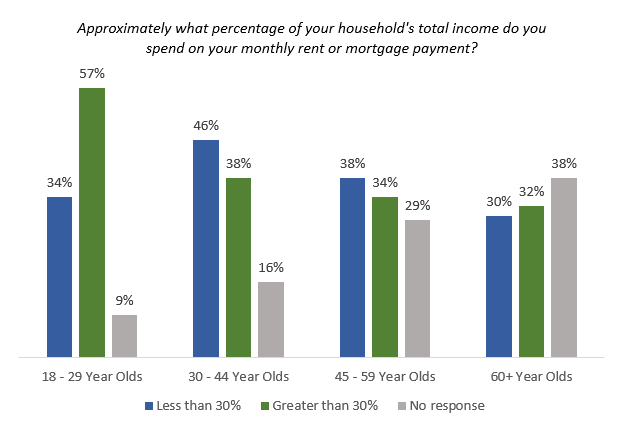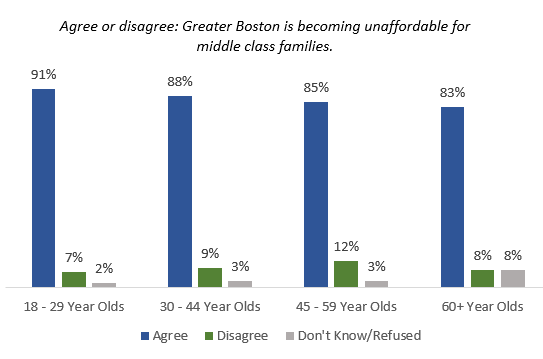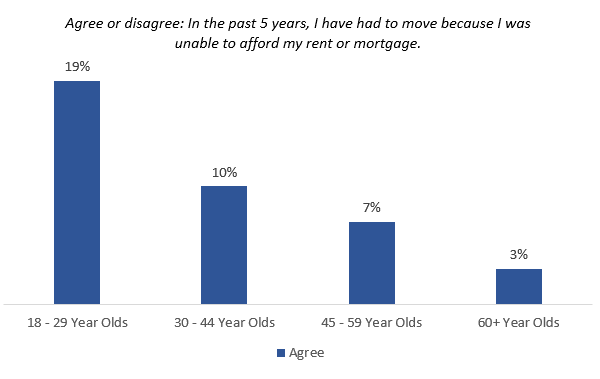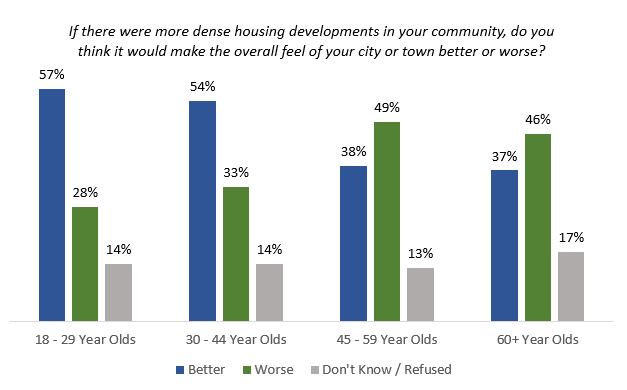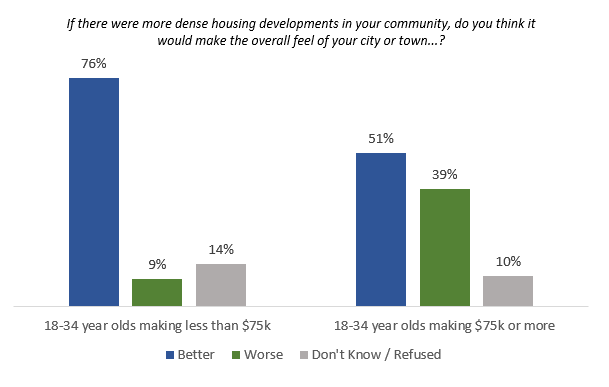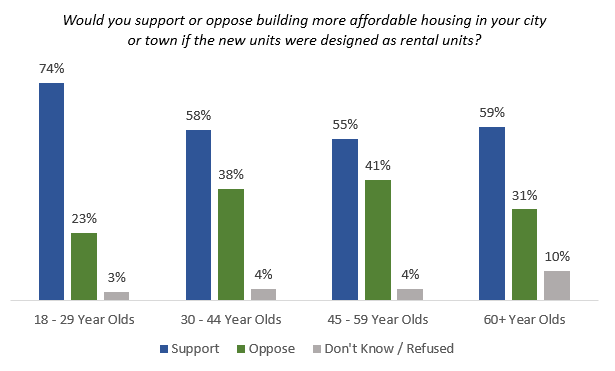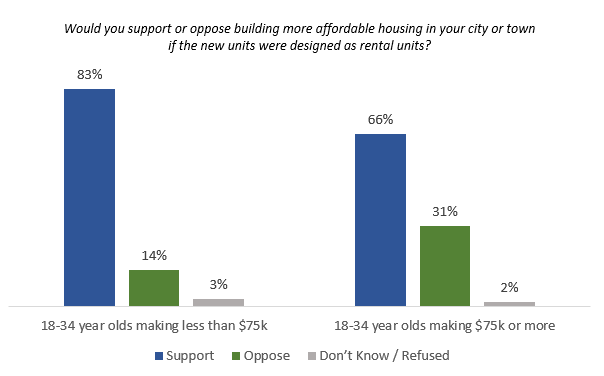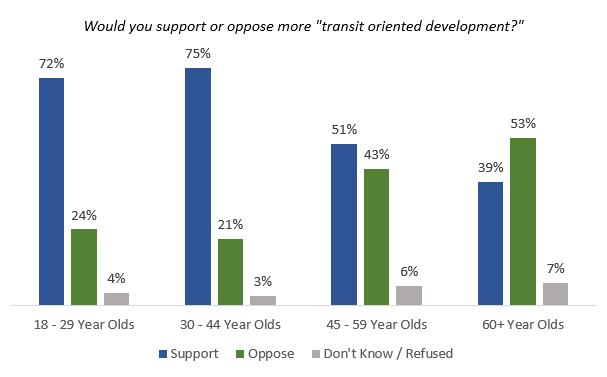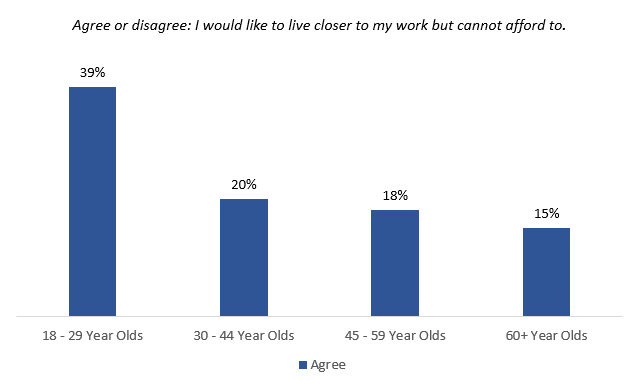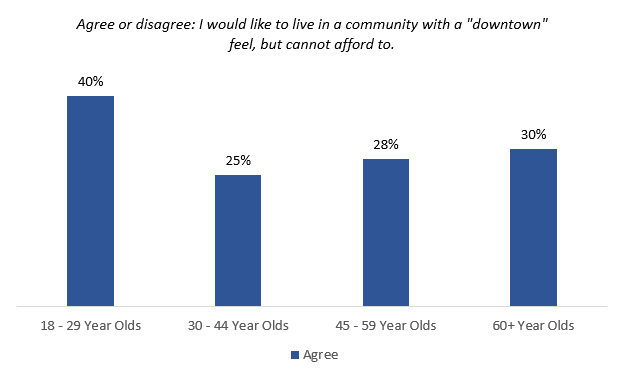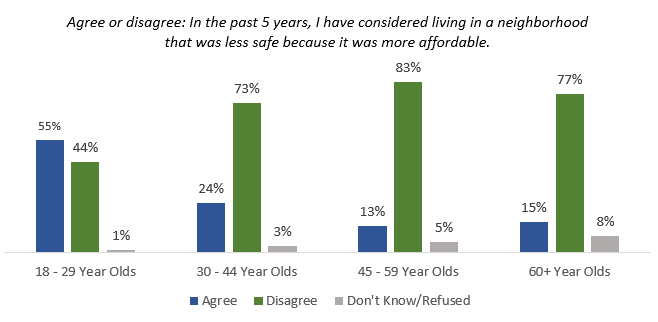Boston Housing Challenges Through Millennial Eyes: 9 Findings From a New Poll
By Peter Ciurczak
June 9, 2017
Recently the Boston Foundation commissioned a poll from the MassINC Polling Group asking registered voters about their perceptions of housing issues in the Greater Boston area. Since the poll breaks out respondents into four different age categories, we can compare the opinions of millennials (18-29 year olds, based on the survey’s definition) with those of older voters. The poll also allows us to make some comparisons between the perspectives of millennials earning less than $75,000 a year with those earning $75,000 or more.
Several key themes jump out:
• Millennials are very concerned about rising housing costs (as are people of all ages).
• Millennials are more supportive of dense, transit oriented development than older voters.
• Lower-income millennials are more supportive of building additional rental units and clustering these more densely around public transit stops.
Scroll through this brief for more specific data on the opinions of millennials and housing in Boston.
More than half of millennials spend over 30 percent of their income on housing.
Looking at whether a household spends more than 30 percent of their income on rent or mortgage payments is a common metric for assessing housing affordability. The more a household pays on their rent or mortgage, the more difficult it becomes to address other critical needs. Unfortunately, well over half of millennials in Boston are above this 30 percent threshold, a greater percentage than any other age cohort in the city.
Housing affordability is a major concern for all Bostonians, regardless of age.
Though millennials spend more of their income on housing than older Bostonians, all age groups are concerned that Boston is becoming increasingly unaffordable for middle class families. Specifically, greater than 80 percent of respondents in each age category feel that Greater Boston is becoming increasingly unaffordable for middle class families.
Millennials are much more likely to move due to high housing costs.
While the majority of respondents haven’t been forced to move due to high housing costs, nearly twice as many millennials have had to move compared to the older cohorts in the poll.
PERSPECTIVES ON POTENTIAL HOUSING SOLUTIONS
Density improves the feel of a community for Millennials, yet makes it feel worse for older respondents.
One tension in local housing debates revolves around people’s preferences for how densely populated a given area ought to be. The poll surfaces a stark contrast on this front. A majority of respondents between 18 and 44 years old think that density improves the feel of their community, whereas older voters are much more likely to think greater density makes their community feel worse.
Interestingly, there are also stark differences within the millennial cohort when broken down by income. (Due to small differences in the clustering of respondents, when we break down millennials by income, that cohort is defined as 18 to 34 year olds. Everywhere else in this article we define millennials more narrowly as 18 to 29 year olds). Only a slim majority of 18 to 34 year-olds making $75,000 or more believe denser housing will make their cities or towns feel better, while nearly 40 percent believe such housing would make their municipalities feel worse.
Millennials are more supportive of building additional rental units.
Millennials are significantly more supportive of building additional rental units as one strategy for addressing the area’s high cost of housing – supporting more rental units by at least 15 percentage points more than any other age cohorts. Millennial support for the development of additional rental units is possibly related to the fact that they are more likely than other age groups to rent their home rather than to own it (40 percent of millennials rent their place of residence, roughly twice the rate of all older cohorts in the survey).
Again, however, there are clear differences within the millennial population when broken down by income. For those millennials making $75,000 or more, the share opposing additional rental units is more than double the share for those making under $75,000 (31 percent vs 14 percent). Support among higher-income millennials is lower by about one-fifth.
Millennials strongly support transit oriented development.
Support for Transit Oriented Development (TOD) is particularly strong among millennials and people aged 30-44. By contrast, support for TOD falls off quickly as respondents get older. In fact, respondents over 60 years of age are 14 percentage points more likely to oppose greater density near public transit than to support it.
Millennials value living closer to work more than older cohorts.
In keeping with a millennial desire for transit oriented development, nearly 40 percent of millennials expressed a desire to live closer to work – while also being unable to do so as a result of cost. This result was double that of the next closest cohort of 30-44 year olds. It’s important to recognize that this is not a measure of who lives closer to work, but rather the desire to do so. Though majorities of each cohort disagree with the statement, it’s possible they do so in part because they already feel that they are live close enough to work.
Many millennials want to live in a community with a downtown feel, but cannot afford to.
Related to their desire to live closer to work, four in ten millennials expressed interest in living in a community with a “downtown” feel, but cannot afford to, a response significantly higher than for other age groups. These findings appear consistent with millennials’ support for building additional rental units and for more transit oriented development. Again, however, this metric indicates only desire; there may be individuals who disagreed with the statement because they desire to live in an area with a downtown feel and already do.
High housing costs are more likely to drive millennials to consider living in a less safe neighborhood.
More than 70 percent of each of the survey’s older cohorts has never considered living in a less safe neighborhood in exchange for affordability. For millennials however, that number is starkly different. More than half of millennials report that high housing costs have driven them to consider living in a less safe neighborhood.

